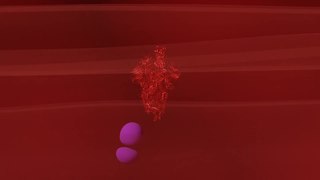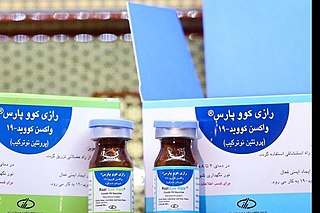Related Research Articles

CureVac N.V. is a German biopharmaceutical company. It develops therapies based on messenger RNA (mRNA). Headquartered in Tübingen, Germany, the company was founded in 2000 by Ingmar Hoerr (CEO), Steve Pascolo (CSO), Florian von der Mulbe (COO), Günther Jung, and Hans-Georg Rammensee. CureVac has approximately 375 employees since May 2018.
Arcturus Therapeutics is an American RNA medicines biotechnology company focused on the discovery, development and commercialization of therapeutics for rare diseases and infectious diseases. Arcturus has developed proprietary lipid nanoparticle RNA therapeutics for nucleic acid medicines including small interfering RNA (siRNA), messenger RNA (mRNA), gene editing RNA, DNA, antisense oligonucleotides, and microRNA.

An mRNAvaccine is a type of vaccine that uses a copy of a molecule called messenger RNA (mRNA) to produce an immune response. The vaccine delivers molecules of antigen-encoding mRNA into immune cells, which use the designed mRNA as a blueprint to build foreign protein that would normally be produced by a pathogen or by a cancer cell. These protein molecules stimulate an adaptive immune response that teaches the body to identify and destroy the corresponding pathogen or cancer cells. The mRNA is delivered by a co-formulation of the RNA encapsulated in lipid nanoparticles that protect the RNA strands and help their absorption into the cells.

A COVID‑19 vaccine is a vaccine intended to provide acquired immunity against severe acute respiratory syndrome coronavirus 2 (SARS-CoV-2), the virus that causes coronavirus disease 2019 (COVID‑19).

The Moderna COVID‑19 vaccine, sold under the brand name Spikevax, is a COVID-19 vaccine developed by American company Moderna, the United States National Institute of Allergy and Infectious Diseases (NIAID), and the Biomedical Advanced Research and Development Authority (BARDA). Depending on the jurisdiction, it is authorized for use in people aged six months, twelve years, or eighteen years and older. It provides protection against COVID-19 which is caused by infection by the SARS-CoV-2 virus. It is designed to be administered as two or three 0.5 mL doses given by intramuscular injection at an interval of at least 28 days apart.

The CureVac COVID-19 vaccine was a COVID-19 vaccine candidate developed by CureVac N.V. and the Coalition for Epidemic Preparedness Innovations (CEPI). The vaccine showed inadequate results in its Phase III trials with only 47% efficacy. In October 2021 CureVac abandoned further development and production plans for CVnCoV and refocused efforts on a cooperation with GlaxoSmithKline.

ARCT-021, also known as LUNAR-COV19, is a COVID-19 vaccine candidate developed by Arcturus Therapeutics.

The Sanofi–GSK COVID-19 vaccine sold under the brand name VidPrevtyn Beta, is a COVID-19 vaccine developed by Sanofi Pasteur and GSK.

iNCOVACC is an intranasal COVID-19 vaccine candidate developed by Bharat Biotech, American company Precision Virologics and the Washington University School of Medicine in St Louis, Missouri, United States.

UB-612 is a COVID-19 vaccine candidate developed by United Biomedical Asia, and Vaxxinity, Inc. It is a peptide vaccine.

AWcorna, originally termed ARCoV and also known as the Walvax COVID-19 vaccine, is an mRNA COVID-19 vaccine developed by Walvax Biotechnology, Suzhou Abogen Biosciences, and the PLA Academy of Military Science. In contrast to other mRNA COVID vaccines, such as those by Pfizer-BioNtech and Moderna, this vaccine primarily targets the Sars-CoV-2 receptor-binding domain of the spike protein, rather than the entire spike protein. It is approved for Phase III trials in China, Mexico, Indonesia, and Nepal.

V-01 is a protein subunit COVID-19 vaccine candidate developed by a subsidiary of Livzon Pharmaceutical Group Inc.

Razi Cov Pars is a COVID-19 vaccine developed by the Iranian Razi Vaccine and Serum Research Institute Razi Cov Pars is a covid-19 vaccine based on recombinant protein, which is being produced by Razi Vaccine and Serum Research Institute, Iran. This vaccine is the first injectable-intranasal recombinant protein corona vaccine.It's the second Iranian COVID-19 vaccine reaching human trials and is currently in phase III of clinical research during which it's compared to the Sinopharm BIBP vaccine.

mRNA-1283 is a COVID-19 vaccine candidate developed by Moderna.

COVI-VAC is a COVID-19 vaccine developed by Codagenix, Inc. In December 2020, COVI-VAC started a Phase I clinical trial, involving 48 participants. The trial was scheduled to complete in June 2021, with results to be reported by May 2022. On September 29, 2021, Codagenix presented positive phase 1 data for COVI-VAC at IDWEEK2021. Data indicates that COVI-VAC is well tolerated, with no significant adverse events reported and that administration of the intranasal vaccine was immunogenic and capable of blocking nasal replication of the virus with minimal viral shedding, recorded at levels lower than those likely to result in subsequent transmission of COVID-19. Furthermore, COVI-VAC was shown to stimulate both serum and mucosal antibody immune responses.

ARCT-154, also known as VBC-COV19-154 in Vietnam, is a COVID-19 vaccine candidate developed by Arcturus Therapeutics. For its development, Arcturus collaborated with Vinbiocare, a Vietnamese company, for support with clinical trials and manufacturing.

AdCLD-CoV19 is a COVID-19 vaccine candidate developed by Cellid Co, a company from South Korea.

COVID-19 vaccine clinical research uses clinical research to establish the characteristics of COVID-19 vaccines. These characteristics include efficacy, effectiveness, and safety. As of November 2022, 40 vaccines are authorized by at least one national regulatory authority for public use:

Soberana Plus, technical name FINLAY-FR-1A, is a COVID-19 candidate vaccine produced by the Finlay Institute, a Cuban epidemiological research institute.

S-268019-b is a protein subunit COVID-19 vaccine candidate developed by Shionogi.
References
- ↑ "Gritstone Announces Private Placement Financing of $55.0 Million". Globe Newswire. 16 September 2021. Retrieved 22 September 2021.
- ↑ "Early trial of multivariant COVID-19 vaccine booster begins in Manchester". ManchesterUniversity. 20 September 2021. Retrieved 22 September 2021.
- ↑ "Gritstone Bio Doses First Volunteer In Phase 1 Trial Of GRT-R910 As COVID-19 Vaccine Booster". Nasdaq. 20 September 2021. Retrieved 22 September 2021.
- ↑ "Trial of first COVID-19 variant-proof jab begins in UK". Arab News. 21 September 2021. Retrieved 22 September 2021.
- ↑ "Gritstone Announces Positive Preclinical Data in Non-Human Primate Challenge Study with Second-Generation COVID-19 Vaccine Against SARS-CoV-2". GlobeNewswire News Room (Press release). 2021-11-10. Retrieved 2021-12-06.
- ↑ "Gritstone Announces Dosing of First Solid Tumor Patient with Optimized SLATE "Off-the-Shelf" Mutant KRAS-directed Neoantigen Immunotherapy in Phase 2 Clinical Trial". Global Newswire. 17 September 2021. Retrieved 22 September 2021.